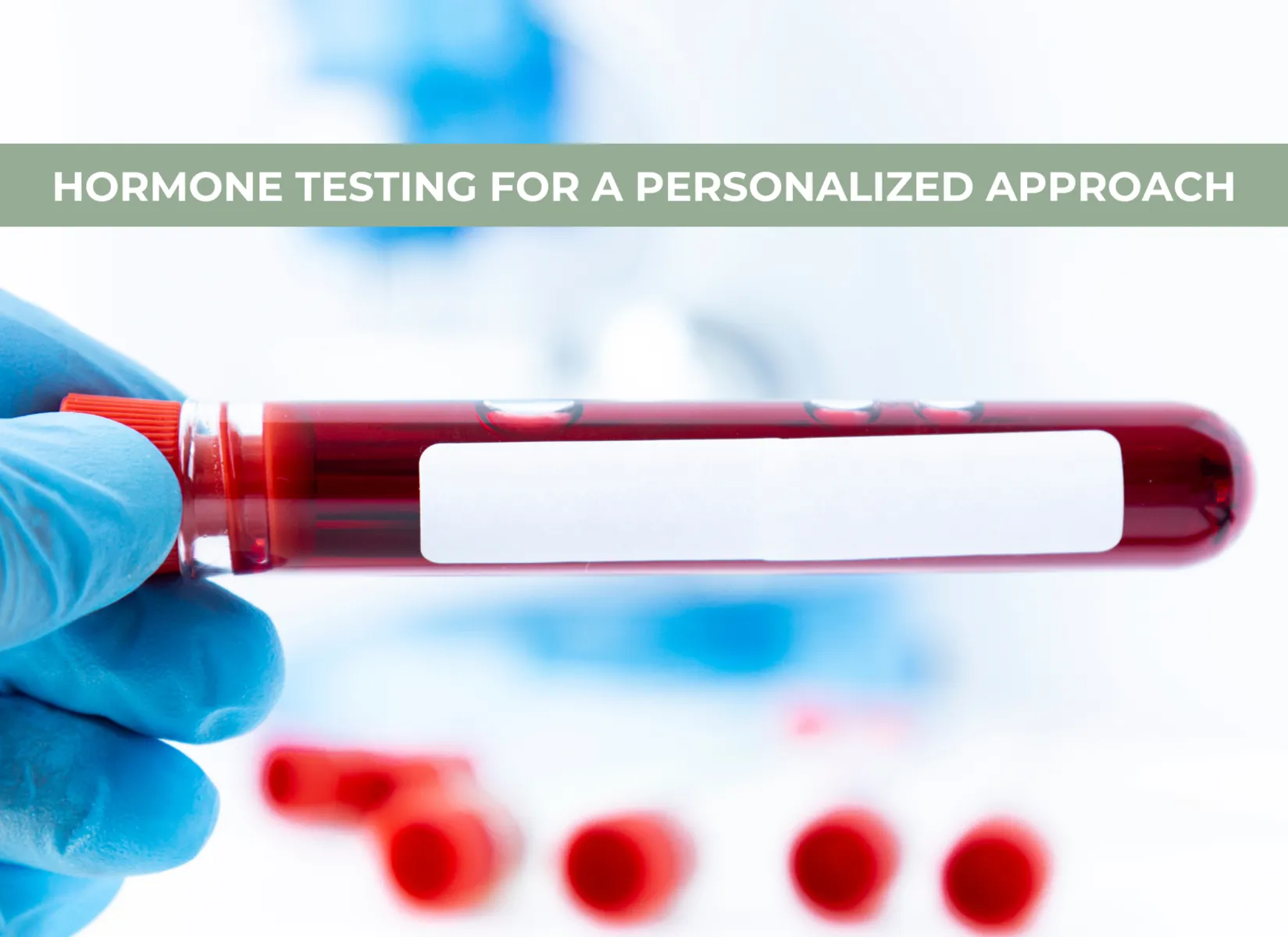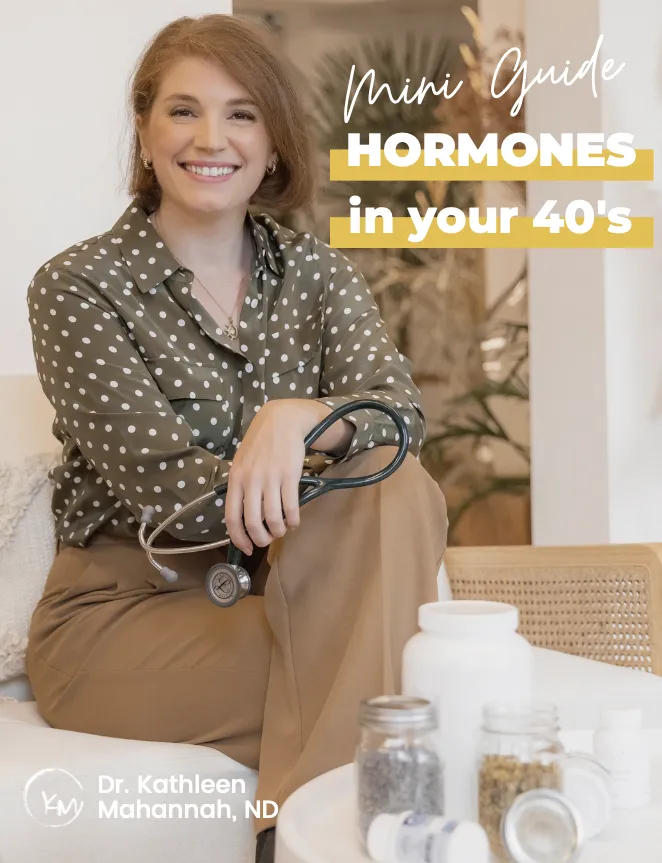For women in their late 30’s into the 40’s, perimenopause can be a difficult time. During this hormone transition period, women often experience a range of symptoms, including weight gain. This can be frustrating and overwhelming, especially when you are already doing “all the right things” with nutrition and exercise that have always seemed to work in the past. By understanding the connection between perimenopause hormone changes and weight gain, this can help to direct exactly how to maintain a healthy weight during this time of life. This article will elaborate on hormone changes in perimenopause, and what blood tests may be useful in assessing your metabolism at this life stage.
What is Perimenopause?
Perimenopause is the time leading up to menopause, which can last anywhere from 4-10 years. During this time, the ovaries produce less and less progesterone, and estrogen levels are erratic and less predictable as they are declining over time. These hormone changes lead to changes in the menstrual cycle and a wide range of other symptoms, including hot flashes, night sweats, worsened PMS symptoms, mood changes and heavier periods, to name a few. For many women, weight gain is also a common symptom of perimenopause.
Why does perimenopause cause weight gain?
There are several factors that can contribute to weight gain during perimenopause and menopause. One of the main factors is changes in hormones. As estrogen and progesterone levels decline over time, this can contribute to reductions in the body’s natural ability to burn calories and maintain a healthy body weight. More specifically, these hormone changes can lead to:
Changes in weight distribution.
As estrogen declines, weight gets distributed on the body differently: it tends to be added to the waist and abdominal area.
Changes in muscle mass.
With the decline of hormones, it becomes a little harder to gain and maintain muscle mass. In fact, muscle mass tends to decline around this time. This means less metabolically active tissue to help with burning calories every day.
Changes in hunger and satiety signalling.
Estrogen plays a role in modulating “hunger cues,” which helps to prevent overeating. Some studies suggest that fluctuating estrogen levels in perimenopause can reduce the effectiveness of hunger hormone control.
Increased cortisol (stress hormone).
Perimenopause symptoms can impact sleep quality, mental health and resilience to stress. Furthermore, most women have incredibly high demands in their lives during this decade, from career demands, to managing kids and family, to caring for older parents and more. The increased stress (cortisol) levels contribute to weight gain, especially around the waist. Higher cortisol can also contribute to increased appetite, higher blood sugar and a decrease in metabolism.
Increase in blood sugar and insulin resistance.
The changes in estrogen levels, perimenopause symptoms, nutrition and lifestyle choices in perimenopause can also lead to insulin resistance, or prediabetes. Insulin is a “storage hormone” that can promote weight gain around the waist.
Mental health challenges that impact eating habits and lifestyle.
If you’re suffering from night sweats, insomnia, and depression related to perimenopause, it will feel more difficult to engage in regular exercise and good dietary habits.
Reduced physical activity.
Women tend towards being more sedentary with age. Whether this is due to factors such as desk jobs, more time spent driving kids around, or less time for intentional exercise, this is another factor that influences weight gain in perimenopause.
Perimenopause and Weight Management: Hormone Testing for a Personalized Approach
Every woman’s experience of perimenopause and weight is unique, and there is no one-size-fits-all solution. For this reason, I take a personalized approach to helping women navigate this time of life, starting with blood testing. Here is a list of the metabolic hormones and markers I often assess in my perimenopause patients during our first visit:
- This includes TSH, free T4, free T3, and Antithyroperoxidase Antibodies (ATPO).
Insulin and Blood Sugar assessment.
- This includes fasting insulin, fasting glucose, HbA1c.
Cholesterol Panel.
- Total cholesterol, LDL, HDL, Triglycerides. In patients with a strong family history of cardiovascular disease, this may also include lipoprotein A and apolipoprotein B.
Inflammatory Status Assessment.
- C-Reactive Protein (CRP, or hsCRP) levels help give insight into metabolic dysfunction and cardiovascular disease risk.
Vitamin D.
- Low vitamin D is associated with metabolic dysfunction in obesity, diabetes, fatty liver disease, cardiovascular disease, osteoporosis, among other health concerns. Some studies suggest that appropriate supplementation of vitamin D may help weight management efforts. I always recommend screening this in a blood test before supplementing with levels over 1000IU per day, as it is possible to overdose on vitamin D.
4-Point Cortisol Adrenal Panel.
- This is special test that involves collecting 4 samples of saliva or urine in a day to assess the fluctuations of cortisol throughout the day.
Physical Exam.
- A blood pressure check and assessment of waist circumference are important aspects of the overall cardiometabolic health assessment in perimenopause.
Download your FREE Guide to Hormones in Perimenopause
Learn more about:
The most common hormone imbalances in perimenopause
What stage of perimenopause you're in
The most important TESTS to have done at this stage
Grab your free copy, now!
Perimenopause and Weight Management: A Personalized Plan
As frustrating as it is to experience weight gain even though you’re “doing everything right,” I want you to know that with the right support and guidance, you can absolutely take control of your health, manage your weight and feel confident in your body, once again. For many, this process involves a thorough reassessment of your metabolism and some readjusting of nutrition and exercise habits to effectively support your body during this stage of hormone transition.
In my practice, a thorough perimenopause support plan includes:
- Testing and assessment
- Herbal and nutritional supplements to target and support any metabolic concerns, as well as address and support perimenopause symptoms
- A discussion about Hormone Therapy and whether this may be appropriate part of a treatment plan
- A thorough review of nutrition, eating habits and exercise routines, and a plan to optimize this to enhance metabolism in perimenopause
- A review of personal and family medical history, to assess for any other health risk factors
- A plan for monitoring progress and providing support for the duration of the program
I will elaborate on each of these aspects of perimenopause metabolism in future articles, be sure to get on my mailing list to be notified when they are published.
Yours in Hormone Health,
Dr. Kathleen Mahannah ND
Dr. Kathleen Mahannah is Naturopathic Doctor licensed by the College of Naturopathic Physicians of British Columbia. Her practice focusses in women's health and hormone balancing using natural medicine and Hormone Therapy, particularly for women in perimenopause and menopause. Dr. Mahannah completed a Degree in Physical Education and Health from University of Toronto, and Diploma of Exercise Science from Capilano College, before obtaining her Diploma of Naturopathic Medicine. She has been practicing for over 6 years in North Vancouver, BC, Canada. Learn more about Dr. Mahannah here.
References
Perna S. Is Vitamin D Supplementation Useful for Weight Loss Programs? A Systematic Review and Meta-Analysis of Randomized Controlled Trials. Medicina (Kaunas). 2019 Jul 12;55(7):368. doi: 10.3390/medicina55070368. PMID: 31336940; PMCID: PMC6681300.
Chopra S, Sharma KA, Ranjan P, Malhotra A, Vikram NK, Kumari A. Weight Management Module for Perimenopausal Women: A Practical Guide for Gynecologists. J Midlife Health. 2019 Oct-Dec;10(4):165-172. doi: 10.4103/jmh.JMH_155_19. PMID: 31942151; PMCID: PMC6947726.
Greendale GA, Sternfeld B, Huang M, Han W, Karvonen-Gutierrez C, Ruppert K, Cauley JA, Finkelstein JS, Jiang SF, Karlamangla AS. Changes in body composition and weight during the menopause transition. JCI Insight. 2019 Mar 7;4(5):e124865. doi: 10.1172/jci.insight.124865. PMID: 30843880; PMCID: PMC6483504.
UpToDate (2023) Obesity in adults: Etiologies and risk factors. Obtained online from this article.
All content found on this website was created for informational and general educational purposes only. The content is not intended to be a substitute for professional medical advice, diagnosis, or treatment. Always seek the advice of your primary care provider or other qualified health professional with any questions you may have regarding a medical condition. Never disregard professional medical advice or delay in seeking it because of something you have read on this website.





